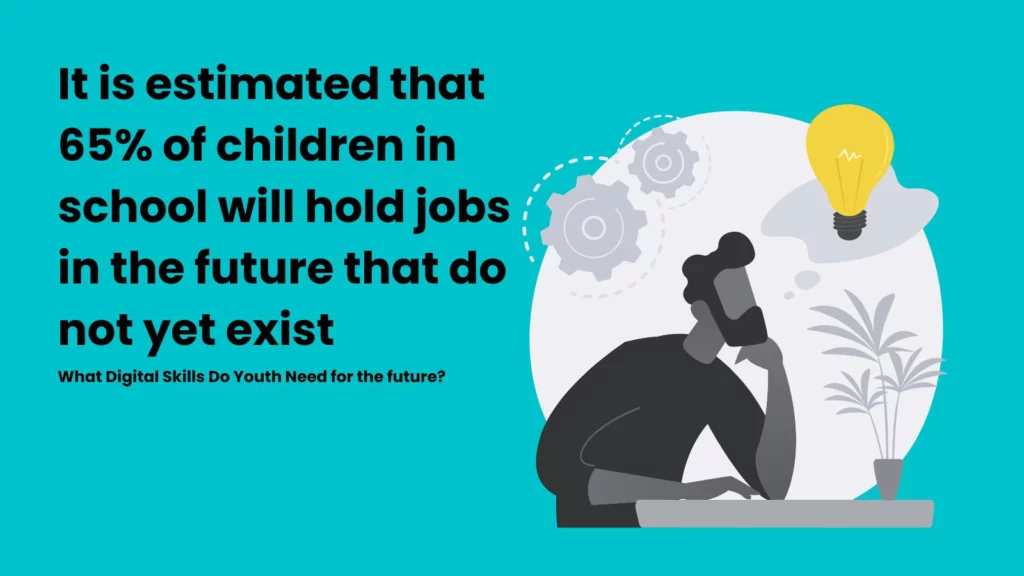British Columbia’s Digital Literacy Framework defines digital literacy as “the interest, attitude and ability of individuals to use digital technology and communication tools appropriately to access, manage, integrate, analyze and evaluate information, construct new knowledge, and create and communicate with others.”
Ultimately, digital literacy involves a fluent and adaptable understanding of technology. It is important to note that digital natives — the younger generation who grew up using technology — are not always comprehensively ‘digitally literate.’
Youth and students should continuously work on and maintain their digital literacy, as it is the foundation of both today and tomorrow’s workforce. It is estimated that 65% of children in school will hold jobs in the future that do not yet exist, and the necessity for digital skills in the workforce is ever-increasing each year.
The BC Ministry of Education has identified six main characteristics or categories of digital literacy in order to inform the teaching of these skills:

RESEARCH AND INFORMATION LITERACY
Research and information literacy concerns how students use digital tools to gather and use information.
Youth and students with digital literacy are able to effectively and efficiently locate trustworthy information on the internet and are skilled at evaluating digital information. They can collect, compare, contrast, and combine information to make productive conclusions.

CRITICAL THINKING, PROBLEM SOLVING, AND DECISION MAKING
Critical thinking, problem-solving, and decision making are three skills or disciplines that encompass digital literacy.
Youth and students should be able to utilize the appropriate digital tools and media to complete tasks like conducting research, representing information in different ways, and solving problems.
Students should be able to draw meaningful conclusions from digital information and create digital projects that enhance their learning.

CREATIVITY AND INNOVATION
This component of digital literacy involves creative and innovative thinking. While not inherently digital skills, these skills can be performed in digital spaces to discover and convey innovative ideas.
Digitally literate youth are able to use technology to their creative advantage, producing original content via digital text, audio, video, and multimedia storytelling.
Moreover, students should understand and be able to analyze the cultural impact and trends that digital media fosters.

DIGITAL CITIZENSHIP
Digital citizenship covers a lot of ground: online privacy and safety, online relationships and communication, online identity, and online ethics, as well as the student’s attitude towards the digital tools they use and the digital space they interact with.
Digitally literate youth should be aware of their role within the largely digital world and their responsibilities to be careful, cautious, and ethical in their usage of technology.

COMMUNICATION AND COLLABORATION
Communication and collaboration is another main component of digital literacy. Youth should be able to communicate and collaborate effectively and productively via digital tools.
Digital communication presents its unique work challenges, like the barriers to accurately conveying emotions digitally. Moreover, digital literacy in communication and collaboration means that the student successfully interacts and exists within a community of other digital users.

TECHNOLOGY OPERATIONS AND CONCEPTS
The digitally literate student understands the foundations and the everyday use of common digital tools, uses digital tools to become more personally productive and independent, and is able to learn and adapt to new emerging technologies.
HOW ABOUT SPECIFIC DIGITAL SKILLS IN DEMAND TODAY?
Among the most in-demand job skills are blockchain, cloud computing, artificial intelligence, UX design, scientific computing, and video production.
However, ‘digital skills’ come in a variety of forms—from basic technological literacy to advanced skill and knowledge.
Here are some of the most in-demand digital skills right now, as reported by Accenture:

CODING
Some jobs that require coding skills only require proficiency in a few coding languages while others require a broader range of coding proficiency.
Coding is ever-evolving, with the industry preferences for coding languages shifting continuously and newer models emerging.

CONTENT CREATION
Content is increasingly dominating the marketing industry and the latest digital marketing trends, so it isn’t surprising that content creation is considered an integral and in-demand digital skill today.

DATA SKILLS
Data skills include the ability to represent, analyze, and make productive conclusions about data using various digital media tools.
While Artificial Intelligence and Machine Learning are advancing and can accomplish certain analytic tasks, data skills remain in high demand for humans.

GRAPHIC DESIGN
Graphic design is another essential skill in the digital world, especially in fields like marketing and web development. Graphic design has been and will remain a valuable digital skill to have.
As digital literacy encompasses a wide range of skills, the World Economic Forum’s recent 2020 Jobs of Tomorrow report shares some broader “skills clusters” in demand today, including:

SOCIAL MEDIA
Unsurprisingly, social media skills are in demand when we are living in a time when people of all ages, from all around the world, from every background, and in all types of fields, can convey online identities on social media.
Companies are now using social media for marketing purposes. Social media skills include a broad range of sub-skills: writing, SEO, design, video production, data analysis, and more.

WEB ANALYTICS
Web analytics skills, similarly to social media skills, are largely in demand, due to the increasing digitization of the corporate world.
Web analytics refers to the analysis of web data like visitor and engagement rates, and thus plays a major role in growing industries like digital marketing.

OPERATING SYSTEMS
Operating systems are another valuable skills cluster. Having knowledge and skills to set up and manage applications or environments using various operating systems is important to many employers, especially in IT.

TELECOMMUNICATIONS
Another essential skills cluster of in-demand modern skills is the telecommunications cluster. Valuable skills in telecommunications include cloud computing, programming, network engineering, and IT support.
Evidently, there are a multitude of digital skills and literacy skills that are valuable and in high demand today. Some skills are more specialized, like for example Java programming.
Others are broader, like content creation. Youth and students should keep up with the current digital literacy skills trends, know what is most relevant to their goals and their field, and upskill to expand their potential for the future of work.

